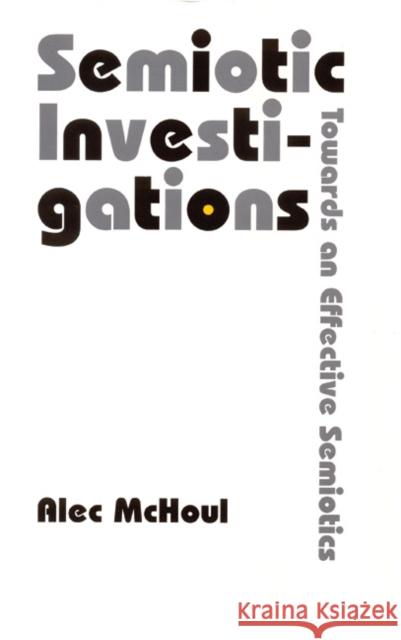Semiotic Investigations: Towards an Effective Semiotics » książka
Semiotic Investigations: Towards an Effective Semiotics
ISBN-13: 9780803231917 / Angielski / Twarda / 1996 / 250 str.
In Semiotic Investigations, Alec McHoul develops a theory of meaning that he calls "effective semiotics"-a theory that investigates "the ways in which signs have meaning by virtue of their actual uses." As McHoul notes, "these uses take place in a number of 'media, ' the most important of which is the medium of history-so important, in fact, that it catches up all the other possible media of semiosis, including everyday life and language, fiction, film, talk, art, mathematics, and] photography. McHoul expounds his theory of effective semiotics-of "meaning-as-use"-in a series of provocative chapters on diverse topics. He begins by examining the relations between semiotics and history and between semiotics and specific communities. He elaborates on the nature of these relations by demonstrating the "effective semiotics" of a particular photograph from the 1880s, episodes from the film Singin' in the Rain and the Batman comics, literary works, children's primers, popular accounts of science, and many other objects, artifacts, and experiences. Semiotic Investigations advances its own comprehensive theory of signs while ably examining works by such distinguished philosophers and theorists as Nietzsche, Wittgenstein, Derrida, Foucault, Habermas, Lyotard, Kuhn, and others. Yet the book is also down-to-earth and clearly written, with an eye towards a startling range of "ordinary" and "uncommon" experiences. It will be required reading for linguists, philosophers, semioticians, anthropologists, literary theorists, and students of cultural studies. Alec McHoul is an associate professor and chair of communication studies at Murdoch University, Perth, Western Australia. He is the author of Telling How Texts Talk: Essays on Reading and Ethnomethodology and coauthor, with David Wills, of Writing Pynchon: Strategies in Fictional Analysis.











